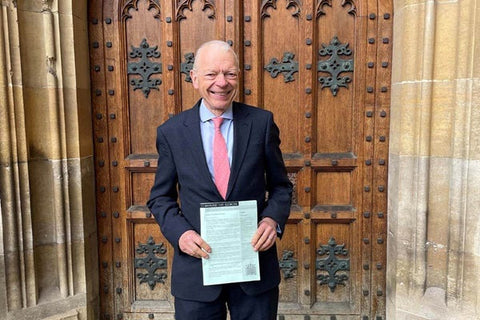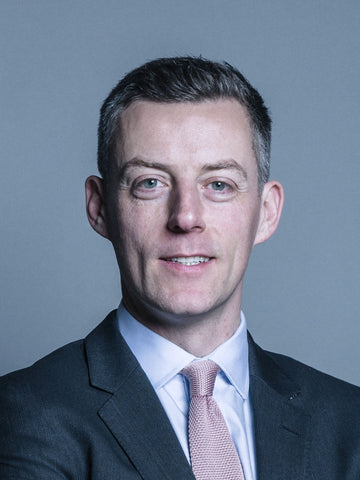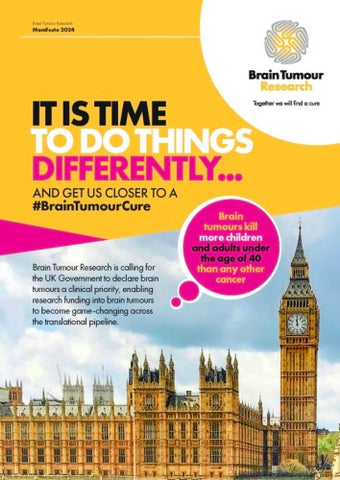Happy Wear A Hat Day!

Our biggest annual fundraiser which, since being launched in 2010, has raised more than £2 million was on Thursday.
To those of you who supported us on the day, whatever you did, thank you.

On Tuesday the Scottish Parliament held a debate on brain tumours which was introduced by Foysol Choudhury MSP.
Mr Choudhury opened the debate by thanking colleagues who had signed his Parliamentary Motion, which noted that brain tumours must be treated as a clinical and strategic priority by government.
The debate saw cross-party contribution from ten MSPs, as well as the Minister, and saw the Cabinet Secretary for NHS Recovery, Health and Social Care Neil Gray remain in the chamber to listen to the opening speeches.
Beatrice Wishart MSP, who has hosted awareness events for Brain Tumour Research, praised the work of the University of Plymouth for their ongoing research into developing a non-invasive blood test to help diagnose and classify meningiomas. She said that it would, “spare future patients from having to undergo invasive surgery, which is what happened to one of my daughters.”
Ms Wishart said she was pleased to announce that she had garnered support from across the chamber to form a Cross-Party Group on Brain Tumours. Subject to the necessary formalities the new group shall be underway soon, with Brain Tumour Research offering the Secretariat. Thanks to Ben MacPherson MSP, Finlay Carson MSP, Jackson Carlaw MSP, Foysol Choudhury MSP and Jackie Baillie MSP for lending their support.
The group will raise awareness of the issues facing the brain tumour community in order to improve research, diagnosis, information, support, treatment and care outcomes.
Minister Jenni Minto said that she “will be very happy to come along to the Cross-Party Group on Brain Tumours once it has been established.”
Thomas attended the debate along with campaigner Nadia Majid (pictured above), and has written a blog about the debate which can be read here.
Three is the magic number when it comes to questions posed to the Government by great friend of Brain Tumour Research Lord Hunt of King's Heath (pictured below).

Lord Philip Hunt of Kings Heath is a Labour Peer and former Health Minister. In 2021 we assisted him in writing the following blog on the need to urgently improve the process for funding research into brain tumours.
Last week the tenacious Lord was asking:
1) His Majesty's Government what steps they are taking to ensure that the National Institute for Health and Care Research, the Medical Research Council, and the UK Research and Innovation work together collaboratively to ensure progress on funding brain tumour research.
2) His Majesty's Government what steps they are taking to reduce the adverse disparity in survival rates for brain tumour patients compared to other cancers whose treatment attracts greater levels of funding.
3) His Majesty's Government whether they will review spending on (1) gliomas, and (2) astrocytoma cancer, to account for any increase in incidences.
As with all other brain tumour related questions raised at Westminster, as soon as we have answers from the Government they will be posted out as part of the campaigning update and uploaded to our PQs page.
This week we joined a policy conference entitled "Next steps for clinical research in the UK"
A wide ranging agenda meant many topics were discussed and all of these are of relevance to our scientific, clinical and campaigning community.
- Awareness of the Integrated Research Application System (IRAS) - a single system for applying for the permissions and approvals for health, social and community care research in the UK. It is provided by the Health Research Authority (HRA) and is a collaborative initiative that streamlines the process for applying for permissions and approvals to conduct health and social care research
- Public Perceptions of Research - Health Research Authority a report launched earlier this year that presents the findings of a study commissioned by the HRA to understand public perceptions of health and social care research in the UK.
- The ongoing development of new clinical trial operating models from the Medicines and Healthcare products Regulatory Agency (MHRA)
- The 2024 voluntary scheme for branded medicines pricing, access and growth (VPAG) which is designed to plough back £400 million from industry ( and used in this context, 'industry' means the pharmaceutical industry) to stimulate innovation and improve the clinical trials landscape
- The position of the Association of Medical Research Charities (AMRC), of whom we are a member, that "research isn't a nice to have it is an essential" but it is struggling in the NHS and so 20% of clinical time should be protected for research.
- Randomisation versus real life data in clinical trials - this is of particular relevance to rarer cancers such as brain tumours where the trial cohort size can be very small.
- The role of Artificial Intelligence (AI) in: drug discovery, gene editing, 'omics', and wearable devices all of which will transform the medical research landscape
- The use of AI to create synthetic data to predict patient outcomes.
- The use of AI to improve take up of trials across different demographics and so challenge the current trial access inequalities.
- The use of AI to reduce and potentially one day eliminate the need for animals in pre clinical work
It was fascinating stuff and are the sort of things we must be aware of, and also be able to bring into discussions with politicians as we steer the path forward post our manifesto launch.

One topic that was mentioned more than any other at the conference was the O'Shaughnessy Review.
On 26th May 2023, the government published a report on the findings of an independent review investigating the challenges facing commercial clinical trials in the UK. The review, led by Lord O’Shaughnessy ( pictured above), involved extensive engagement with pharmaceutical companies, academic institutions, and patient groups.
The report highlights the UK’s pre-eminent position in research and its capability in commercial trials, but finds that the UK is quickly falling behind in an increasingly competitive global landscape, dropping from 4th to 10th place in number of trials initiated since 2017/18.
For the UK to drop out of the top 10 would be disastrous, almost like a relegation with industry less likely to pick the UK as a trial site.
In response to these findings, the review recommends 26 actions for the government, focused around eight critical themes:
- Slow and bureaucratic clinical trial set-up and approval processes
- Lack of transparency and data about commercial trials
- No accountability for under-performance in clinical trials
- Research is not prioritised by or within the NHS
- No incentives for clinicians to be part of commercial research
- Research conversations between clinicians and patients are rare
- NHS’s vast data assets are not leveraged well for clinical trials
- Over-reliance on hospitals
Clinical trials, their existence and availability for brain tumour patients is a part of our manifesto launched last week. The route to trials is early stage science and the funding for that by Government is key. Our manifesto dovetails with the discussions at the conference and with wider aims and ambitions of a Government wanting to make these things happen.
We must now lead the way, showing decision makers how the pathway to a cure can be navigated and this will begin at the proposed May round table ( as mentioned by Minister Stephenson at our launch event last week) and then be monitored by us at Brain Tumour Research through the lens of the recommendations as set by our Chief Executive, Dan Knowles, in the manifesto.

That is it for this week.
Wishing you all a peaceful time this Easter. Like Parliamentarians we are going to have a bit of a break too and so there won't be a campaigning update for a fortnight.
Our campaigning update will be back in your inboxes, on your social media and on our website on Friday 19th April.

